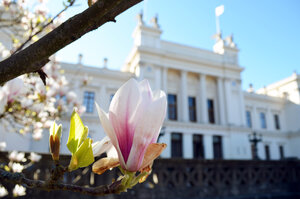Old Testament Exegesis
Old Testament Exegesis belongs to the classical theological disciplines. The subject area is strongly influenced by its closeness to the courses and study programmes and notably interdisciplinary. It has six main fields of study: (1) textual history and canon history; (2) linguistics with philology; (3) history with social history and archaeology; (4) history of religions with the Ancient Near East as particular specialization; (5) theology with history of ideas and history of literature; and (6) the history of interpretation as well as the reception history of the Old Testament.
The discipline is methodologically multifaceted. Classical historical-critical methods are still used in close readings of the texts, while at the same time complemented by methods mainly from modern linguistics, literary criticism and history, as well as from the social sciences. The growing field of history of interpretation further contributes with methods linked to interpretative theory, hermeneutics and ideology criticism. In sum, insights from these areas do, to a considerable degree, contribute to the ongoing academic discussion about the character of religious language(s), as well as to the critical evaluation of the role of religion in contemporary society.
When it comes to the research of scholars in Lund, it has mainly centred on issues at the very core of the discipline: the content, formation and reception of the Old Testament. Inquiries into the literary character and theological profile of Old Testament texts, their original setting in ancient Near Eastern religions and cultural milieus, their potential to shed light on the history and religious development of ancient Israel, as well as their effective history in ancient and modern times have been essential, and as of today, the teaching staff are working with a number of different questions and methods: One project focuses on the development of the notion and distinctive character of God, especially as it relates to the so-called theodicy, through theological perspectives and perspectives from the history of ideas. The way Old Testament texts, mainly the Book of Psalms and the book of Job, interprets and portrays evil, suffering, abandonment and liberation is analysed with special focus on the role played by the deity. Related to this project is another inquiry into the conception of God in the Book of the Twelve. Anthropomorphic and anthropopathic conceptualizations of God in the Book of Hosea are investigated with the aim of tracing experiences of God and understandings of life that have given rise to them. In doing so, the project refers critically and self-critically to current exegetical research on the prophetic literature and Old Testament theology. Questions concerning human response to divine acts are also inquired into, especially in prophetic literature of the Old Testament connected with the Babylonian exile in the 6th century BCE. This particular study focuses on the book of Isaiah, but also other prophetic books such as Jeremiah and Ezekiel. Oracles from prophets during times of political crisis, threats of war and destruction were traded and preserved by later generations so as to offer possible explanations for the suffering experienced, as well as to provide ways forward and prevent future catastrophes. Notions of God in the Old Testament are also studied from the perspective of history of religions. In focus here are 2nd century BCE materials from Syria and Palestine. Especially significant for this project are texts from Ugarit, as they constitute paramount comparative material for the study of the world of the Old Testament. Important is the epic mythological description of how the storm deity Baal defeats his enemies “the Sea” and “Death”, as it provides an important perspective on the tradition historical background to biblical imagery of drought as a metaphor for the power of death. The relation between nature metaphors and mechanically applied “nature mythology” is further problematized and tied to contemporary discussions on drought and natural disasters. A recent project by the same scholar also focuses on early cultural interactions between Indo-European people and the world of the Old Testament.
Education at graduate level in Old Testament exegesis is offered in Sweden only at the universities of Lund and Uppsala, and in Lund, the PhD students are currently working on the following projects: The Pentateuch, or more specifically Leviticus and its purity laws, is the field of study of an ongoing research project. These biblical laws on disease are studied from the perspectives both of textual history and of social history, and the project aims at advancing the understanding of the growth and expansion of these laws over time, as well as their placement in the canon. Social anthropological perspectives enrich a close reading of the development of the laws, which in turn sheds light upon the social function of these laws in their original social contexts. Another project focuses on the final form of the Book of Psalms and the purpose of this collection. With the aid of redaction criticism and metaphor theory, relevant psalms are studied on the basis of the hypothesis that the Book of Psalms is an anthology. Redaction criticism is used to identify a possible final redaction, and metaphor theory is used to analyse notions of God in some important psalms in an attempt to trace the final redactors. The results from these investigations are then placed in relation both to similar redactional processes in Old Testament books from the same period and to an investigation of how the Book of Psalms was used at the time of its final shaping.
The research seminar meets 4-6 times each term, once together with the research seminar for New Testament studies, and on some occasions every year together with the research seminars in Uppsala, Copenhagen, and Oslo, respectively. PhD students and teachers also partake in other seminars at Lund University as well as elsewhere in Sweden and abroad. The subject area thus forms a constitutive part of a full-scale and internationally strong university, of a theological faculty with a broad and in-depth expertise, and of a department of religious studies offering education clearly connected with ongoing research, a research that has its natural place in a modern university with a long history of closely interrelated faculties.


